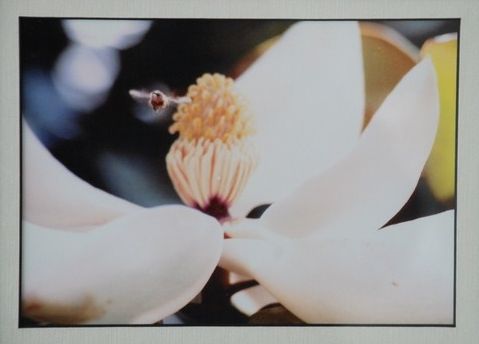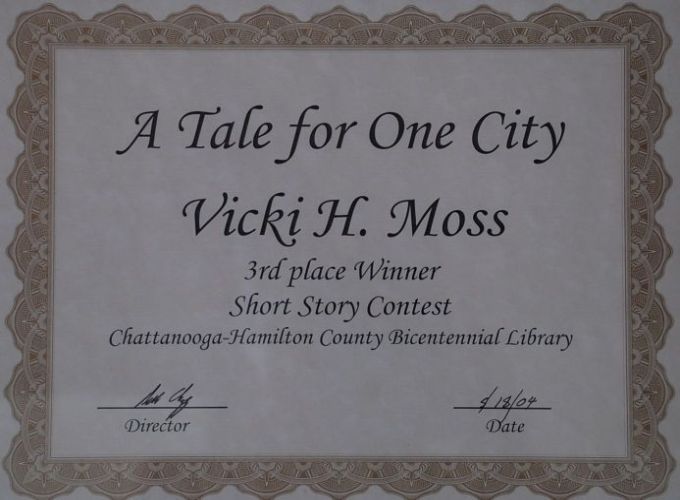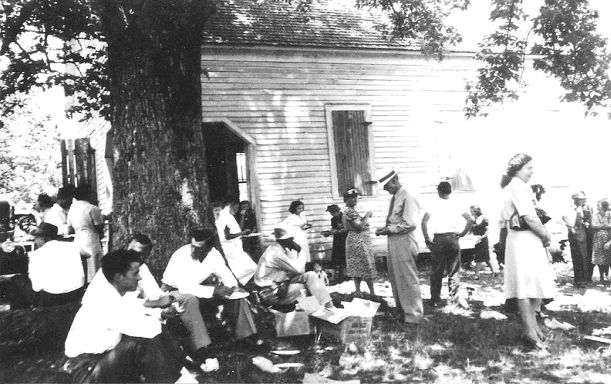I'd already been published in children's magazines with fiction and nonfiction
when I was truly searching for God's will for my life. This was the first piece of
adult fiction I wrote to enter a library contest that required reading
A Lesson Before Dying, by Ernest Gaines.
I had two days to read the book and write a story for the A Tale For One City
contest before deadline. I prayed for third place, throwing out the fleece as Gideon
did, to see if God wanted me to continue writing. I had taken a picture of a bee
flying around my magnolia tree. When I looked at the film after it was developed,
I realized the camera had caught the bee's wings in slow motion. I titled the picture
"The Magnolia Hum" and decided to write the story around the picture as well as
the book theme. It wasn't until after I read the book that I realized I'd already read it
once before!
When I was writing "The Magnolia Hum," I was thinking about the bee flying into the
huge Magnolia blossoms for nectar and also the picture below, a favorite of mine
out of my mother's photo album taken not long after my father's return from World
War II's European Theatre.
This story did win Third Place in the Chattanooga Bicentennial Library Contest. God had
answered specific prayer.
The Magnolia Hum
by
Vicki H. Moss
The dead were all lying there, graves marked by tombstones stating: A mother to five,
kind to all; may he rest in peace. Some quoted scripture from the Bible. I watched my
aging father, Tidence Washburn, struggle to ease himself down on a concrete bench he'd
placed beneath the ancient oak. He swatted a bee annoying the back of his neck. At
fifty-three, I felt as ancient as he looked and the bench remained cold and hard as I
eased beside him to stare at a familiar grave sprouting peonies he'd lately transplanted.
"Your mother's been gone now for three years," said Dad, silent now for a moment except
for the spitting sound his tobacco made when hitting the plastic cup held in his shaking
hand. I was tired of retrieving the dregs of the same conversation over and over again,
reliving the past. "It would have been better if I'd died first, Lucinda Jean, when I'd
had pneumonia, then I wouldn't have to keep coming to these No-name Gap graveyard
decorations, living with everyday pain of not having her here with me."
I hated being called Lucinda Jean, such a country name. Why couldn't he call me Cindy,
like everyone else in the nearby city where I'd grown up. "Everybody has pain in their
lives, Dad." I pushed back dark neckline hair, tired and brittle from being tricked into
remaining youthful, and told my two youngest boys to count car tags from different states
until the women had dinner ready.
"Throughout every step in our lives, Dad, we all have pain. Or have you just forgotten?"
"What kind of pain do you have, girl. Are the kids okay?" It was more a statement than a
question. He hadn't heard a word since his oldest grandchild had graduated and left for
college, though every time I talked to her, I repeated the redundant worn-out sentence
that had become like a recording heard on answering machines owned by humans either too
shy or lacking creativity. "You've reached so-and-so and we're not here at the moment.
Leave your name and number and we'll get back to you, have a great day." Except, my
message was, "You really need to call your grandfather."
I knew a house wasn't the same without a woman's touch. Mother's presence was sorely missed.
It was as painful for me as it was for the kids to be in that tomb without Mother.
I said, "You know, some rube is going to come down here next week and dig up those peonies.
Mother never could keep a rose bush growing on Grandmother's grave."
"Maybe so, but you didn't answer my question. How's Tiffany doing with her fiddle lessons?
Is she learning to play 'Shady Grove?'"
"You know that she isn't learning to play bluegrass at Julliard. And up in New York,
they call it a violin. She's playing classical music. That's what she likes." Dad wiped at
a bloody place on the back of his arm, his bruised looking skin old and thin - at the mercy
of careless door jambs and attacking table ends - always carrying around a scab or two.
"When I bought her that fiddle, I was in hopes she'd make it to the Opry since she was the
only one in the family hinting at a speck of musical talent."
I wiped a tear from my cheek, trying to hide the act, but he missed nothing with his rheumy
watered-down brown irises. "When's the last time you heard from her?" he said. We watched
a black car pull in below at the tiny chapel where services had been held for the last hundred
and fifty years, the same families celebrating birthing and dying, same as the annual corn
crops planted in the adjacent field. I thought about how Tiffany would like that car, how she
thought black was classy.
"I usually hear from her from someone else is the truth of it. How she's left the church because
she no longer buys into Jonah being swallowed by a whale or Jesus being born of a virgin;
making a bad example for her brothers and her umpteen cousins down there getting
ready to eat dinner on the grounds. "Mostly, how she's never coming back to this one-horse
hamlet that rolls up its carpet when the sun goes down." I looked at my father and saw slumped
shoulders and sadness. "Sorry you spent hard earned money on that nice fiddle Dad. The fiddle that you
meant to bring her closer turned out to be the violin that carried her away and gave her a ticket
to freedom; a better way of life in her eyes, I guess."
|
Vicki H. Moss Photography

|
He sighed. "Some things never change. Look at that Magnolia tree. See how those bees are busy
just buzzing around those huge flowers like pigs wallowing in sunshine. I call it the Magnolia Hum;
melody and manna. So many blossoms, so little time to drink it all in. That bee may flit around
aggravating you and me for a time, but the bee will always come back to the blossom. Let me tell
you a story." Then he reminisced about how he too had tried to get away from the farm, the land,
the back breaking work that came from scratching a living out of a hard piece of dirt. Fighting in
Hitler's war through every major battle, he lived through it when all of his buddies died around him.
He hadn't bought into God's story either.
"At the end, I'd seen so much hell, I was begging God to spare me, let me make it back on the last
flight home. German subs were still out and didn't know the war was over. We were sitting ducks in
the air. I became a believer, and made it back, went to town, married, raised a family, all the time
feeling a nagging to return to my roots. So, I bought a small farm close to home. Your roots are what
gives you meaning, reason to be, nurtures you like that magnolia blossom over there is doing for the
bee. That's God doing the pulling, child. He has his ways, but it's all in His timing."
We were silent for a time, the only noise heard was the hum of the bee and the distant hum of people
greeting relatives they saw only once a year, when it came time to clear off the graves of loved ones
who had passed. They always seemed to come back home, maybe not at first, but eventually, when it was
their turn to pick up the hoes and rakes the older folks had laid down, too weak to meet the weeds of
another year's growth.
I heard my youngest counting, "Nine tags, North Carolina. Eight tags, South Carolina. Two tags, Georgia."
"You know Dad, I remember hating driving with you and Mom over to see Aunt Jessie, stopping
at every bluegrass singing on the side of the road between Dillard and Asheville. I couldn't stomach
country music. Later, when I was thirty, I was embarrassed to admit to cousin Jake that I'd recently
acquired a taste for it. He laughed and said he had too. I guess it's like your favorite color changing
every five years. We change as we age, get more mellow; still enjoy some of the same things but learn to
appreciate the new and different as well. But I came back to my roots too."
"That's God growing us girl, bringing us back to the nectar, what really counts; sustenance, the Magnolia Hum."
My two youngest flew back up the hill to the concrete bench. "Mom! Granddad!" they said in unison, unable
to contain their excitement. "That last tag says New York!"



